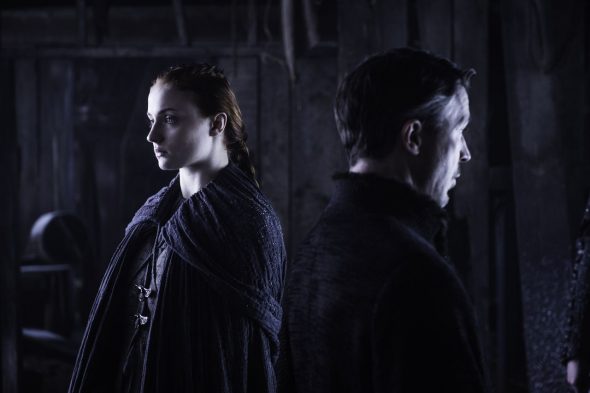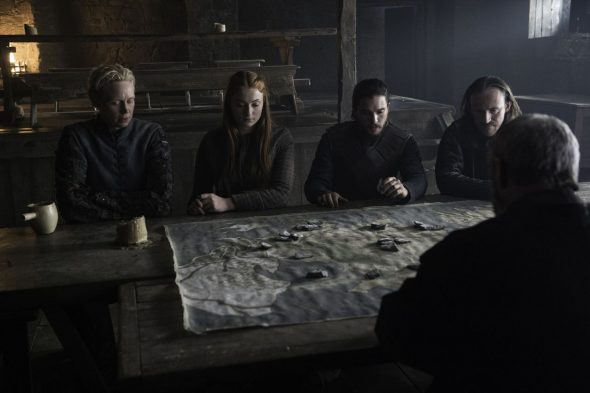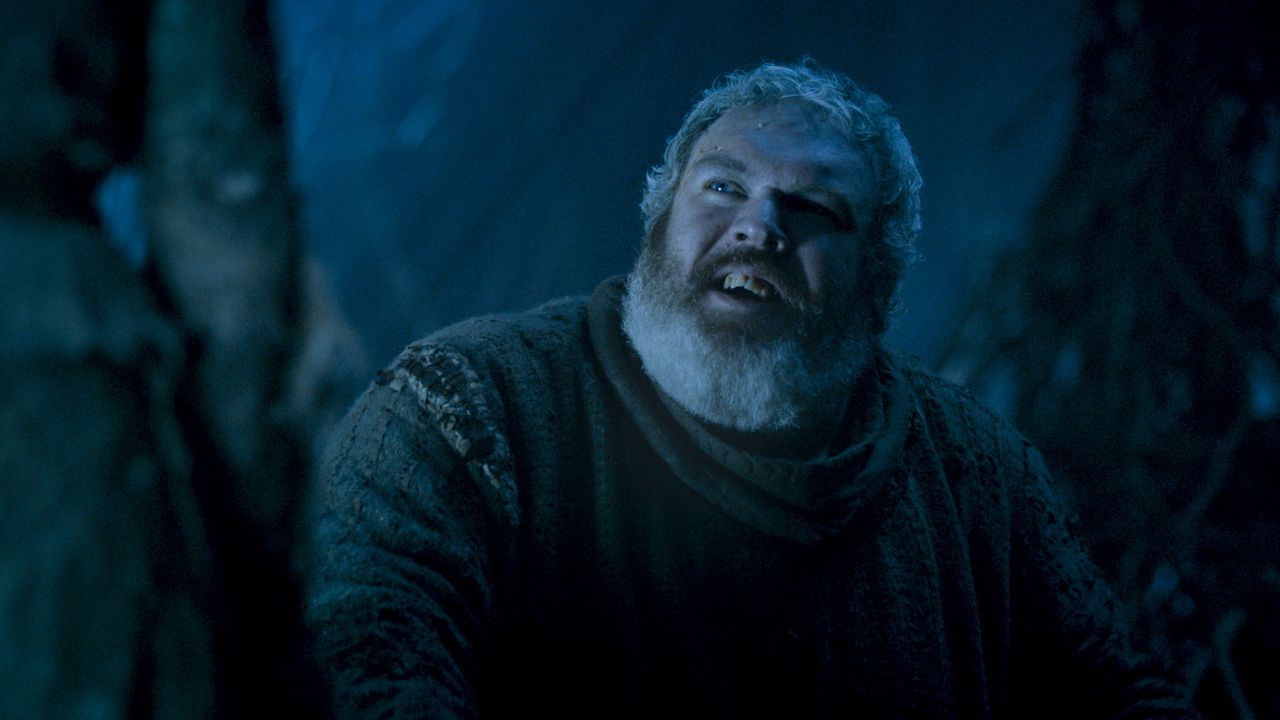This year, we’re going to be putting our day-after observations about Game of Thrones into writing, in a series we call Game of Thrones Unlocked. In keeping with our tradition, these will focus on explicating one scene as an interpretive key for unlocking deeper interpretations of the episode’s themes. These articles will contain spoilers through the episode under discussion. This week, Ben Adams tackles “The Door” (S6 E5).
This episode is a gut punch, I’m not going to lie. Some of our favorite characters get killed off in a particularly gruesome manner. And as that is going on, we find out two things: first, we find out what “Hodor” means, and second, out find out that we absolutely did not want to find out what “Hodor” means.
And in that sense, we the audience are in the same predicament as the characters we observe. The key to unlocking this episode is recognizing the different ways that characters are forced to resolve seemingly contradictory truths.
For instance, Dany must deal with the fact that Jorah is both a traitor to her cause and her greatest champion; he is her trusted advisor and also her biggest liability. In typical Danaerys fashion, she simply demands that the world bend to her will, to resolve the tension through magic: if Jorah is really as loyal as he says, he will heal himself, and the problem will be solved.
Tyrion, on the other hand, shows that he deals with contradictions by simply not resolving them at all. He papers over the seemingly unbridgeable gap between Varys and the Red Priestess by saying, “My friend has a healthy skepticism of religion, but we are all loyal supporters of the Queen.” In classic Tyrion fashion, there’s nothing wrong with some contradictions, as long as the job gets done.
And then there’s Ned Stark. When Ned’s father Rickard Stark sends him off to the Vale, he tells him, “Try not to get into any fights. But if you have to fight, win.” This statement is itself somewhat contradictory—it tells the young boy not to be violent, but at the same time insists that he should become really good at violence. The only way to resolve the tension is for Ned to subscribe to a rigid code of honor. Which works!
Sort of. Because while Ned Stark’s code of honor may have made him into the rare warrior with a conscience, it also lost him his head, as the mummer’s farce in Braavos shows. The contradiction here is how the satire both obscures and reveals the truth. Jester Ned Stark is a drunken, boisterous fool whose behavior could not be less like the dour, serious, and honorable Real Ned Stark. So the play is a lie. But at the same time, one can’t help but remember that it was Ned’s foolish devotion to honor that caused his own downfall. In the lie, we get some truth.
And speaking of the Starks, Sansa and Jon are finally off to take on the Bastard of Bolton. Here, Sansa is the one in an impossible, contradictory position. On one hand, we know that the Knights of the Vale may make the difference between victory and defeat in the wars ahead. But how could it be possible for Sansa to forgive his betrayal of her to Ramsay Bolton?

This scene was particularly intense because it’s the first time that Sansa has been able to confront one of her tormentors in a situation where she had the power. For five-and-a-half seasons, Sansa has consistently been in the power of others, subject to their whims. And now, finally, she gets have at least a little bit of power for herself: as she tells Littlefinger, she could have Brienne cut him down if she doesn’t like his answers.
Which is why I’m so worried about what Littlefinger is up to. As Sansa points out, either Littlefinger is a fool (if he didn’t know about Ramsay when he delivered Sansa to the Boltons) or Littlefinger is evil (if he did). Littlefinger claims the former, but that’s difficult to believe, given his history of being one move ahead of pretty much everyone. Sansa doesn’t really seem to believe him either.
So either Littlefinger is losing a step, or this is all part of a larger gambit. That’s why we should probably be skeptical of Littlefinger’s claim that Brynden the Blackfish is back in business and raising the Riverlords. Throughout the conversation, Littlefinger doesn’t really do any scheming at all; he mostly just takes it on the chin from a justifiably angry Sansa. If there’s something hidden here, it has to be in his “one last thing” about the Blackfish in the Riverlands.
Of course, the biggest contradiction revealed in this episode is in the magical backstory of the Others and the Children of the Forest. The Children of the Forest have always been the source of our best hopes to defeat the Others: they had obsidian, and magic to keep them out of the Three Eyed Raven’s cave. Only it turns out that not only did the Children of the Forest create the Others, they did it specifically to kill all the humans. (Which still might work.) Trouble is, the Others are also perfectly happy to kill all the Children too.

Which brings us to the final contradiction in this episode: the long odds faced by our favorite raised-from-the-dead-former-Lord-Commander. As he points out, he can’t defeat the Boltons to the South and the Others from the North. But he has to—it’s the only way to survive. So all he can do is take on one challenge at a time.
It’s hard at this point to see how that happens. Bran is on the run, and the Boltons seem more powerful than ever. Sometimes all we can do is hold the door. R.I.P. Hodor.

NOOOOOOO-DOR!
A Game of Thrones came out in 1996. Mr. Martin sat on the “Hodor” reveal for 20 years. Then Dan and Dave get to let the cat out of the bag. For whatever reason, that bothered me a bit more than the death.
Also, Hodor’s mind was ripped through time from his teenage self by Bran and forced to fight zombies. Do we think Hodor has been living that moment for the rest of his life? Did he experience his death before his mind returned to its proper place in time? Did Hodor know he was going to die in that cave when they first arrived?
Now that GoT has introduced time travel, should we forget that ever happened? Or, is Bran going to have to McFly a solution to the white walkers? What’s gained by opening up that particular paradoxical door?
Finally someone appreciates that I had all of my best ideas 20 years ago and have dragged them out with dead-end stalls! I’d scorn those show runners, with their concise storytelling… if it weren’t for the fact that the royalties are totally making it possible for me to hold off on writing that scene entirely.
So few people are able to properly revel in the fact that there were people of Wyliss’ age, at the time when I conceived of that idea, who now have children Bran’s age.
Signed,
George
ps. You’re going to love it when winter never happens.
The outline that George R. R. Martin gave to Weiss & Benioff for this episode was like:
“Spoilery Woilery!
Hodor (nèe Wyllis) was
Brain-jacked by Bran back when
he was a tyke.
p.s.
Non-paradoxical
Time travel’s possible:
Use it to kill someone
Nice that we like.”
(If you’re new to the site and don’t get why I’m writing doggerel, click here.)
I don’t think it is so unbelievable that Littlefinger was honestly unaware of the extent of Ramsay’s depravity. Recall that Theon was the ward of Ramsay’s liege lord, and he didn’t even recognize Ramsay when they first met. There would be less opportunity and, frankly, less reason for Baelish to have as extensive a spy network in the North as he possesses in King’s Landing, as there is far less potential return on the investment (which would need to be massive, as the North is large, insular, and distant from his seat of power). Roose’s comments about his concern for the consequences of Ramsay gaining a reputation as a “mad dog” indicates that he has yet to earn such a reputation outside of those who have had direct experience with him.